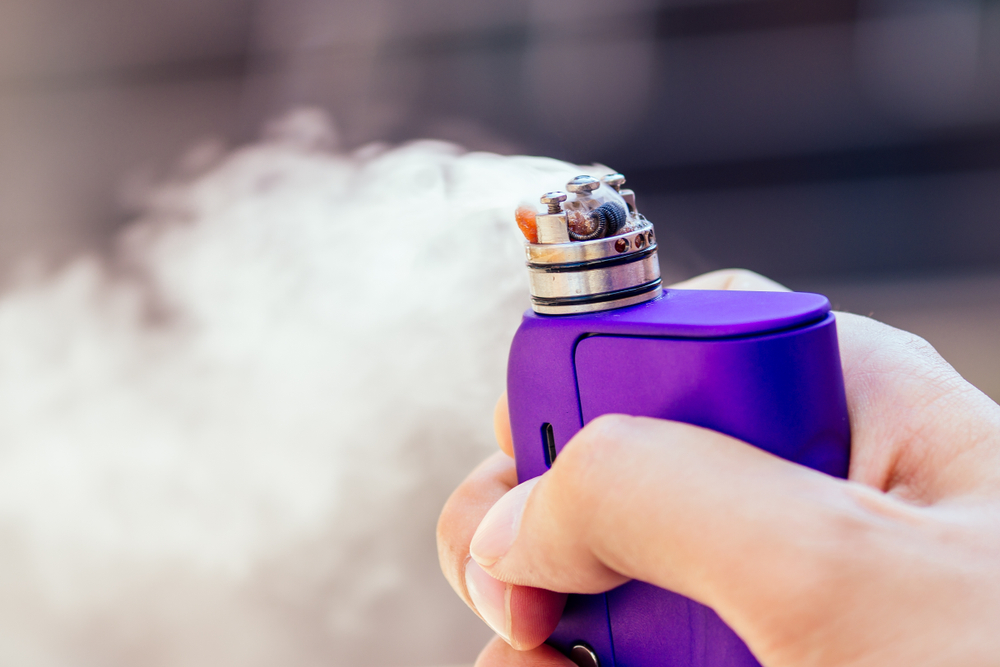Home › Singapore Buzz › Breaking the Cycle: How We Can Prevent Drug Abuse Together
Home › Singapore Buzz › Breaking the Cycle: How We Can Prevent Drug Abuse Together
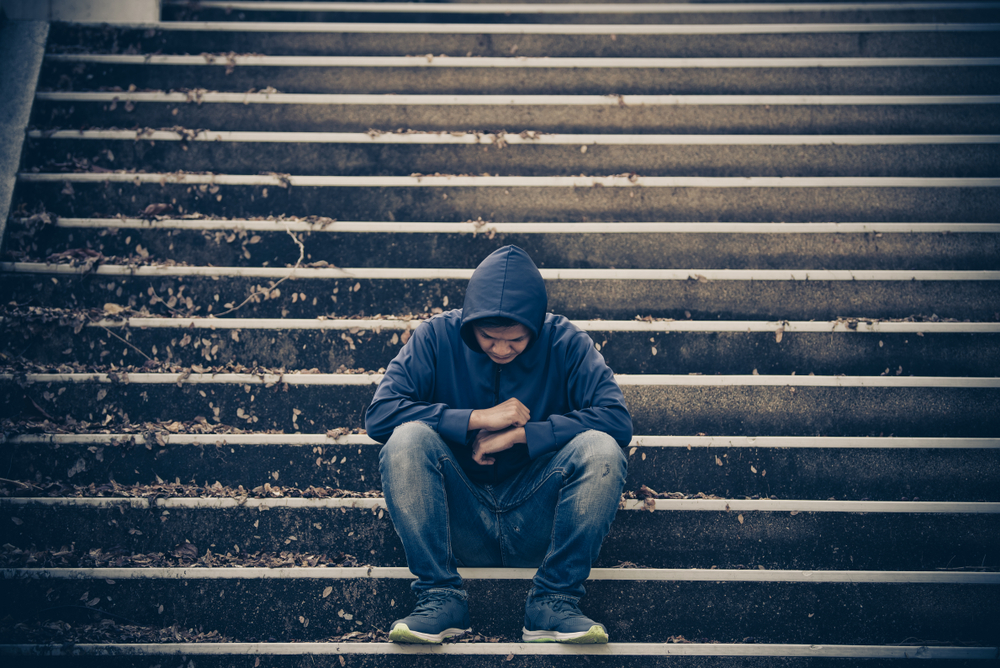
Drug abuse affects more than just the individual — it can deeply affect families and communities. Here’s how awareness, early action, and support can make a difference.
Even after his father was released from jail and entered recovery, 18-year-old Xavier* struggled to trust him again. Once close, their bond was now fractured by years of trauma linked to drug abuse. Xavier kept his thoughts to himself, uncertain how to process the emotional pain of the past.
His story is just one example of how drug abuse ripples far beyond the user. While over 600,000 people die from drug abuse globally each year, the number of people emotionally and psychologically affected is far higher.
On Drug Victims Remembrance Day (16 May 2025), we remember those whose lives have been disrupted — or destroyed — by drugs, and call for greater awareness, empathy, and early intervention to protect those who suffer in silence.
Traumatised by his parents’ divorce and his father’s drug-related behaviour, Xavier began acting out in primary school — storming out of class, neglecting schoolwork, and lashing out at others.
Research shows that children who experience unstable home environments due to drug use are more likely to develop mental health issues such as anxiety, depression, and conduct disorders. Many, like Xavier, struggle to regulate emotions, leading to anger, aggression, and isolation.
Studies show a heightened risk of child maltreatment in households affected by substance abuse. In Xavier’s case, his father resorted to caning out of fear his son might follow a similar path – a response that ultimately created distance and emotional pain.
Drug abuse leaves lasting scars even on those in recovery. Many former users face a high risk of relapse, particularly when exposed to stress — a concerning reality in Singapore, where the average age of first-time drug use is just 16.
One example is PTE Choy*, who abused drugs and inhalants before his enlistment. Placed under a Drug Supervision Order by the Central Narcotics Bureau (CNB), he entered recovery but struggled with the adjustment to National Service (NS) while coping with his family’s financial issues, his father’s poor health, and his brother’s incarceration.
Like Xavier, PTE Choy struggled with emotional regulation – a common challenge during recovery. The lingering effects of drug abuse shaped his behaviour and temperament. His Commanding Officer, CPT Lim, recognised his struggles and stepped in — helping him apply for financial support and encouraging him to stay on track with camp training.
Today, PTE Choy is able to accept disciplinary correction without lashing out. He’s committed to his counselling and urine tests, and has even been promoted to LCP.
While NS can be a challenging period of transition, the added burden of addiction recovery made it even more difficult. Without support from CPT Lim and his own determination to change, PTE Choy could have easily relapsed.
If you notice these behaviours in a loved one, it may be time to intervene:
– Sudden sleep issues or unusual energy patterns
– Slurred speech or slowed movements
– Disorientation or confusion
– Unexplained weight changes
– Periods of excessive sleep
– Wearing long sleeves to hide injection marks
– Dental issues (especially from methamphetamine use)
– Frequent coughing, nosebleed, or sinus problems
Source: Health Promotion Board
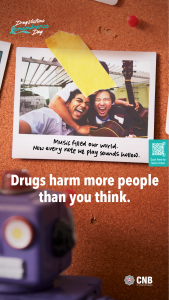 Drug abuse affects people of all ages and backgrounds. In 2024, the youngest drug abuser arrested in Singapore was just 13, and more than half of all new abusers were under 30.
Drug abuse affects people of all ages and backgrounds. In 2024, the youngest drug abuser arrested in Singapore was just 13, and more than half of all new abusers were under 30.
The physical consequences are severe. Overdoses can cause seizures, permanent brain damage, and death. Long-term use of substances like heroin can lead to kidney issues and rewire the brain to fuel compulsive drug-seeking, while methamphetamine abuse increases the risk of heart failure and stroke.
In Singapore, nearly one in three former drug offenders return to drug use within two years of their release. Many struggle with the stigma of their past and face limited job opportunities, making it harder to reintegrate into society.
Strained family relationships, separation and unresolved emotional trauma can make recovery even more complex. Isolated and under financial pressure, many turn to drugs again to cope — fuelling a painful cycle.
Yet there is hope. A 2021 Singapore Prison Service study found that a strong support system and rehabilitation services greatly reduce relapse risk, helping former abusers reclaim their lives.
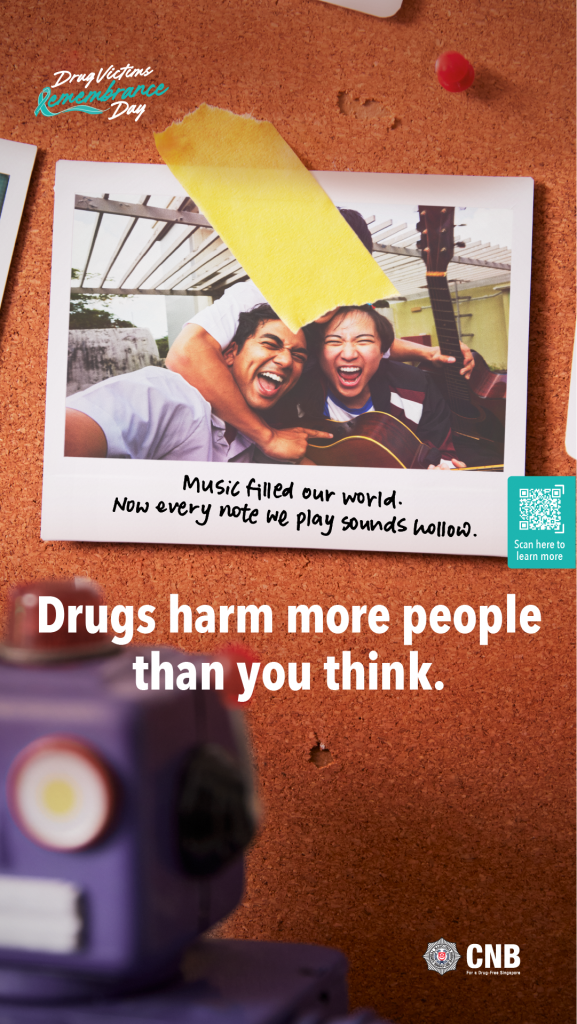
Drug abuse affects people of all ages and backgrounds. In 2024, the youngest drug abuser arrested in Singapore was just 13, and more than half of all new abusers were under 30.
The physical consequences are severe. Overdoses can cause seizures, permanent brain damage, and death. Long-term use of substances like heroin can lead to kidney issues and rewire the brain to fuel compulsive drug-seeking, while methamphetamine abuse increases the risk of heart failure and stroke.
In Singapore, nearly one in three former drug offenders return to drug use within two years of their release. Many struggle with the stigma of their past and face limited job opportunities, making it harder to reintegrate into society.
Strained family relationships, separation and unresolved emotional trauma can make recovery even more complex. Isolated and under financial pressure, many turn to drugs again to cope — fuelling a painful cycle.
Yet there is hope. A 2021 Singapore Prison Service study found that a strong support system and rehabilitation services greatly reduce relapse risk, helping former abusers reclaim their lives.
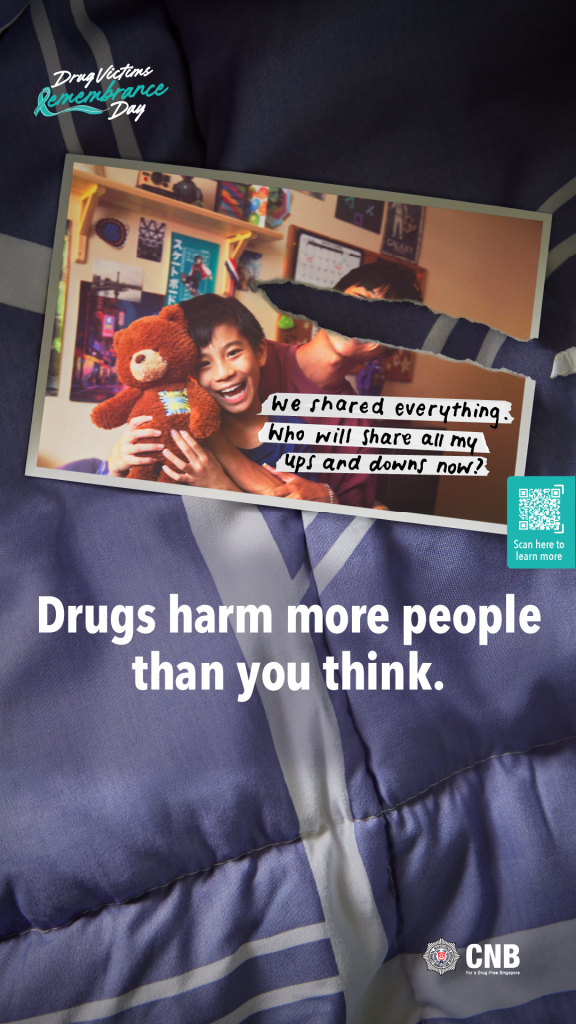
With the normalisation of drug use online and growing peer pressure among youth, prevention must start early — and be sustained.
Preventive Drug Education (PDE) remains a cornerstone of Singapore’s anti-drug strategy. The Central Narcotics Bureau (CNB) works closely with schools, community groups and volunteers from the DrugFreeSG Advocacy Network to raise awareness about drugs and help young people make informed choices.
In 2024, schools hosted events such as the Anti-Drug Ambassador Activity and the DrugFreeSG Montage Competition. Students also participated in essay and video contests focused on staying drug-free.
CNB’s whole-of-government approach includes the appointment of DrugFreeSG Champions and a Ministerial Dialogue on Singapore’s drug control policy. Minister for Home Affairs and Law, Mr K Shanmugam, reaffirmed Singapore’s strong stance against drug abuse and announced new efforts to counter the global drug trade.
In the community, CNB lit up major buildings in green and white — the colours of the Anti-Drug Ribbon — as part of the DrugFreeSG Light-Up on 26 June 2024. The initiative symbolised national unity in support of a drug-free world.
Other efforts included a Parenting Conference with Berita Harian, collaborations with the Singapore Indian Development Association, and outreach during the annual Campus Legends esports tournament, which featured a special seminar on protecting youth from drug harm.
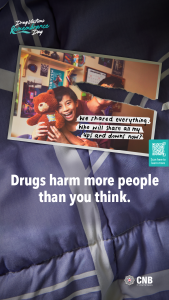 With the normalisation of drug use online and growing peer pressure among youth, prevention must start early — and be sustained.
With the normalisation of drug use online and growing peer pressure among youth, prevention must start early — and be sustained.
Preventive Drug Education (PDE) remains a cornerstone of Singapore’s anti-drug strategy. The Central Narcotics Bureau (CNB) works closely with schools, community groups and volunteers from the DrugFreeSG Advocacy Network to raise awareness about drugs and help young people make informed choices.
In 2024, schools hosted events such as the Anti-Drug Ambassador Activity and the DrugFreeSG Montage Competition. Students also participated in essay and video contests focused on staying drug-free.
CNB’s whole-of-government approach includes the appointment of DrugFreeSG Champions and a Ministerial Dialogue on Singapore’s drug control policy. Minister for Home Affairs and Law, Mr K Shanmugam, reaffirmed Singapore’s strong stance against drug abuse and announced new efforts to counter the global drug trade.
In the community, CNB lit up major buildings in green and white — the colours of the Anti-Drug Ribbon — as part of the DrugFreeSG Light-Up on 26 June 2024. The initiative symbolised national unity in support of a drug-free world.
Other efforts included a Parenting Conference with Berita Harian, collaborations with the Singapore Indian Development Association, and outreach during the annual Campus Legends esports tournament, which featured a special seminar on protecting youth from drug harm.
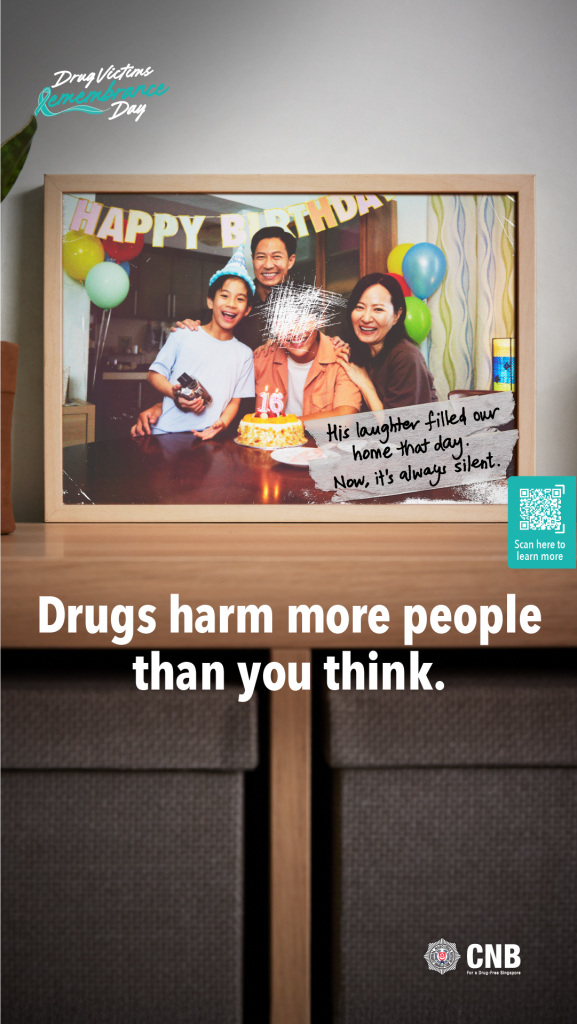
Drug prevention begins at home. Through honest, age-appropriate conversations, parents can address misconceptions, understand emotional triggers, and guide their children toward healthy choices.
Educators, friends, and neighbours also play a key role in raising awareness, identifying warning signs, and supporting those affected. Suspected abuse can be reported anonymously via the CNB hotline: 1800-325-6666.
Drug abuse is preventable — but it takes awareness, support and early intervention from all of us. On this Drug Victims Remembrance Day, let’s honour those impacted by drugs and commit to building a more compassionate, drug-free Singapore.
*Names have been changed for privacy.
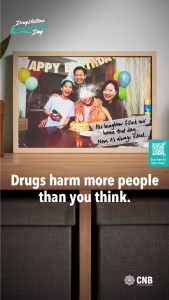 Drug prevention begins at home. Through honest, age-appropriate conversations, parents can address misconceptions, understand emotional triggers, and guide their children toward healthy choices.
Drug prevention begins at home. Through honest, age-appropriate conversations, parents can address misconceptions, understand emotional triggers, and guide their children toward healthy choices.
Educators, friends, and neighbours also play a key role in raising awareness, identifying warning signs, and supporting those affected. Suspected abuse can be reported anonymously via the CNB hotline: 1800-325-6666.
Drug abuse is preventable — but it takes awareness, support and early intervention from all of us. On this Drug Victims Remembrance Day, let’s honour those impacted by drugs and commit to building a more compassionate, drug-free Singapore.
*Names have been changed for privacy.
16 to 18 May 2025
Suntec City Level 1 Atrium
Visit the Museum of Us, a moving exhibition featuring interactive displays, artefacts, and stories that highlight the impact of drug abuse on families. Visitors can also light a virtual candle online to honour victims and view Remember Us — a short film showing how drug use transforms moments of joy into pain. These stories are a powerful reminder of what’s at stake — and why the fight must continue.
Click here for more information.
Like our stories? Subscribe to our Frontline Digital newsletters now! Simply download the HomeTeamNS Mobile App and update your communication preference to ‘Receive Digital Frontline Magazine’, through the App Settings.



